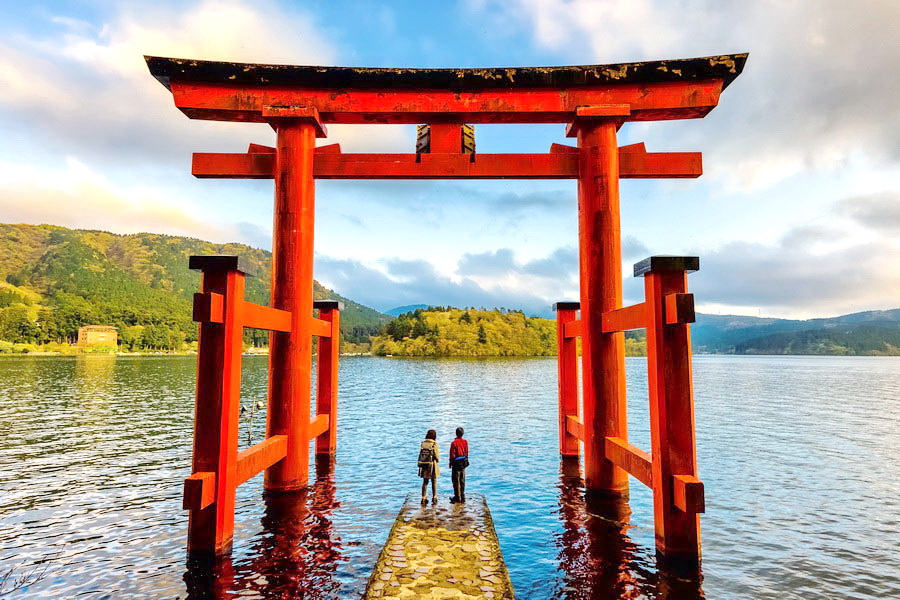Tours, Attractions and Things to Do in Hakone
Hakone Travel Guide
Hiking along the slopes of a volcanic valley, making a wish in a cedar grove, admiring Mount Fuji from the deck of a pirate ship, listening to the legend of a dragon, and, of course, swimming in geothermal springs are just some of the delightful activities that Hakone has to offer visitors.
Hakone is a small town and district in Kanagawa Prefecture, located 90 kilometers (about 55.92 miles) southwest of Tokyo. It is best known for its geothermal healing springs and stunning natural scenery, including breathtaking views of Mount Fuji.
Despite its small population, which does not exceed 15,000 people, you cannot count on peace and solitude here. Hakone attracts up to 20 million tourists each year, making it one of the most popular and busiest resorts in Japan. Whether you are looking for adventure, relaxation, or cultural experiences, Hakone offers many opportunities to engage with its natural beauty and rich traditions.
For more insights and tips, be sure to check out our comprehensive Hakone travel guide.
Hakone Tours
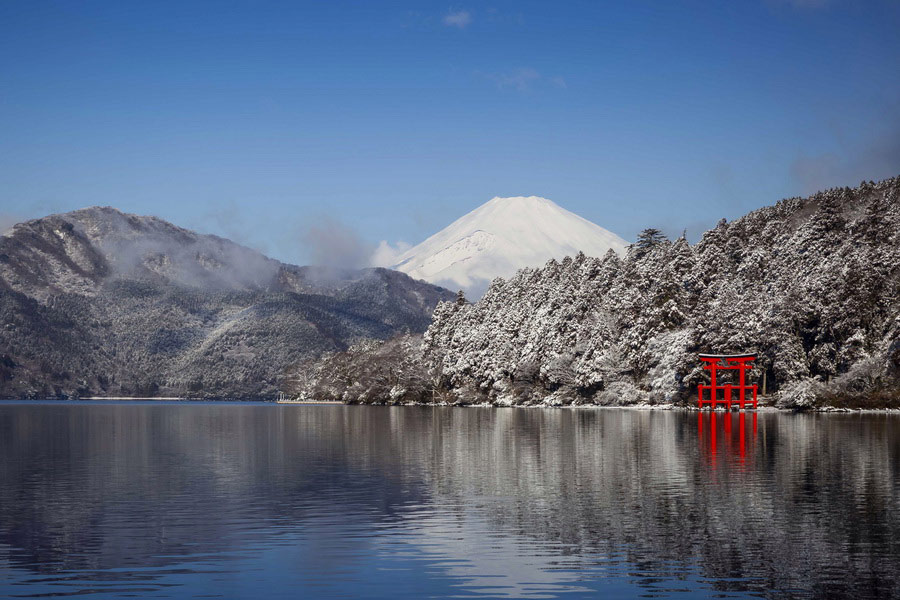
Hakone day trips are an excellent choice if you want to visit this beautiful destination. Hiking, bathing in springs, and visiting temples known for their strong positive energy all contribute to relaxation and the restoration of both physical and spiritual strength.
At the same time, Hakone is fully equipped for extended stays for tourists. You can choose to stay in one of the many traditional ryokan hotels in Hakone, which offer a wonderful traditional atmosphere along with private hot spring baths.
The main types of Hakone tours include:
- Historical tours, which involve walking along the recreated old Tokaidō, visiting temples, and exploring historically significant sites.
- Water tours, featuring a cruise on Lake Ashi aboard a ship decorated in vibrant pirate style.
- Health tours, which focus on visits to hot springs and a cedar grove renowned for its healing properties.
- Cultural tours, as Hakone is home to several museums, including the famous open-air sculpture museum.
- Religious tours, highlighting the many temples and shrines located in the city, including the region's main Shinto temple.
- Nature tours, leading you to breathtaking locations, including the mountains, the volcanic Ōwakudani Valley, and Lake Ashi.
Hakone mild climate makes it ideal for year-round tours. However, the most comfortable climate occurs in summer, with temperatures reaching 23-25 °C. Tours are especially popular in spring when Hakone’s cherry blossoms bloom (hanami), and in autumn when the leaves turn gold, transforming Hakone into a breathtaking landscape.
History of Hakone
The main temple of Hakone was built in the 8th century, marking the beginning of the settlement's rich history, which spans over a thousand years. Over the centuries, Hakone developed an unspoken status as the primary spiritual center of the region, attracting individuals from various social classes who wanted to be protected by the gods. In particular, one of Japan's most famous rulers, Minamoto no Yoritomo, who lived in the 12th century, sought solace and support at this temple and later became a patron of both the temple and the city itself.
During the Edo period (17th-19th centuries), Hakone gained significant historical and logistical importance as it became an important checkpoint on the famous Tokaidō route connecting Tokyo and Kyoto. Since the late 19th century, Hakone has been known primarily as a resort town, providing relaxation and recreation for numerous Japanese and foreign tourists.
Things to Do in Hakone
Landmarks and Attractions in Hakone
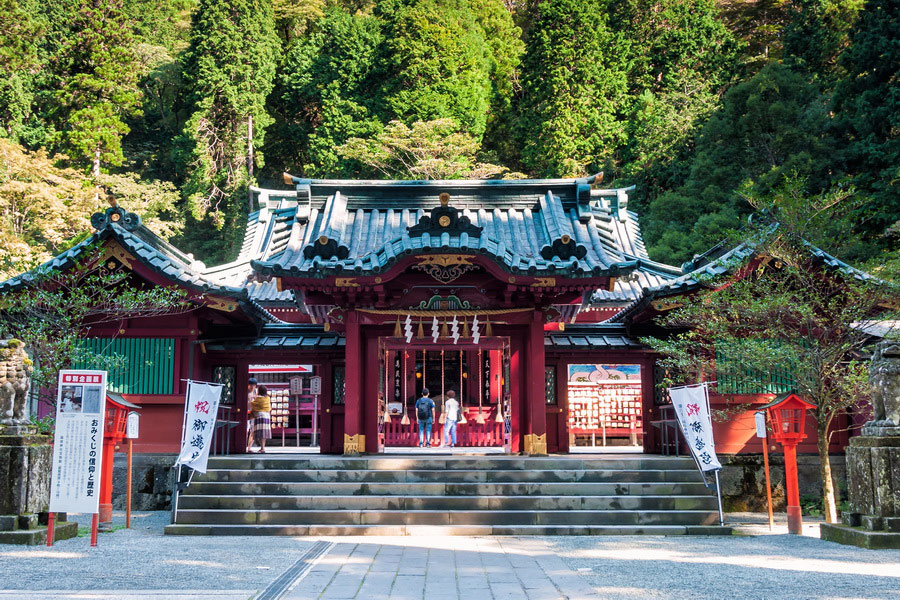
Hakone is well-known primarily for its hot springs, but the town has many other landmarks and attractions, so you can always find things to do in Hakone to spend your time in an unforgettable and productive way.
Hot Springs
The main attraction of Hakone is its hot springs, known in Japanese as onsen. These springs feature a variety of water types, each offering unique health benefits for the body. Among the most notable onsens in the city are Hakone Yumoto Onsen, Kowakudani Onsen, and Kinnotake Tonosawa Onsen.
Most of the springs are public and are typically segregated into men's and women's areas, as bathing in an onsen is traditionally done without clothing. It's important to note that many public springs do not permit entry for individuals with tattoos; therefore, tourists should confirm this detail in advance if necessary.
In addition to the public onsens, private onsen facilities within small traditional hotels in Hakone—ryokans—are also popular. These private onsens provide a more intimate experience, making them ideal for couples or families traveling together.
Volcanic Valley — Ōwakudani
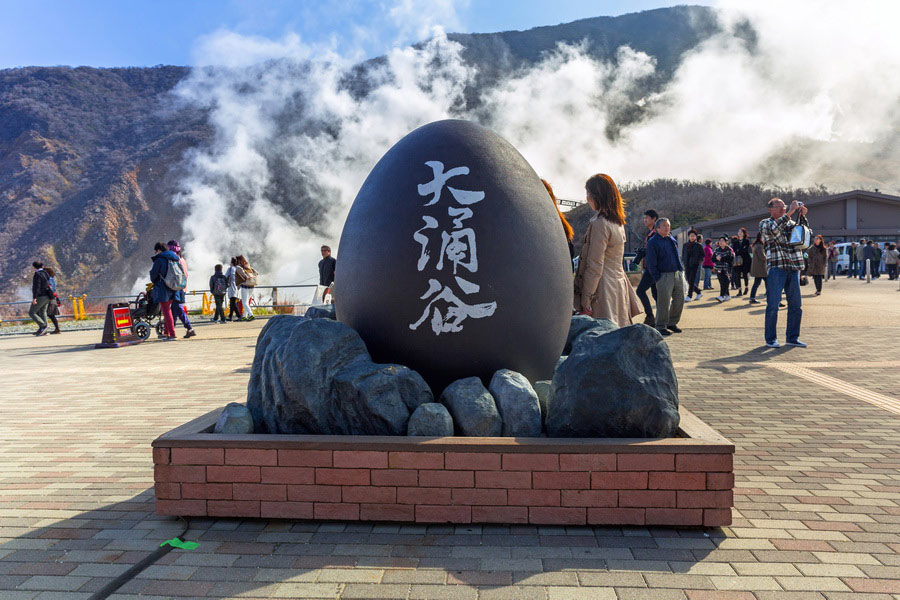
One of Hakone's most distinctive and fascinating natural features is the volcanic valley known as Ōwakudani, formed from the remnants of a volcanic crater that erupted over two thousand years ago. In this unique landscape, traces of ancient dormant volcanoes can be seen alongside several younger volcanoes that still show volcanic activity. As a result, visitors can experience a somewhat mysterious and mystical atmosphere, enhanced by the sight of steaming vents and bubbling hot springs that characterize this extraordinary location. The valley offers a fascinating glimpse into the geological history of the area and is a must-visit destination for those who wish to connect with the raw power of nature.
Hakone Shrine (Hakone-jinja)
Hakone Shrine is the main Shinto temple in the city, renowned for its iconic Torii gate, which stands majestically in the waters of Lake Ashinoko. This Torii, known as "The Gate of Peace" in Japanese, is one of the most recognizable and photographed Hakone attractions, drawing visitors from near and far.
Lake Ashinoko
Lake Ashinoko is a large volcanic lake covering an area of over 7 km2 and reaching depths of up to 45 metres. It is one of the most frequently visited site in Hakone, famous for its stunning views and the myriad of attractions along its shores. A highlight is the pirate ship, which offers a delightful half-hour cruise, allowing visitors to soak up the picturesque scenery of the area.
Hakone Museums
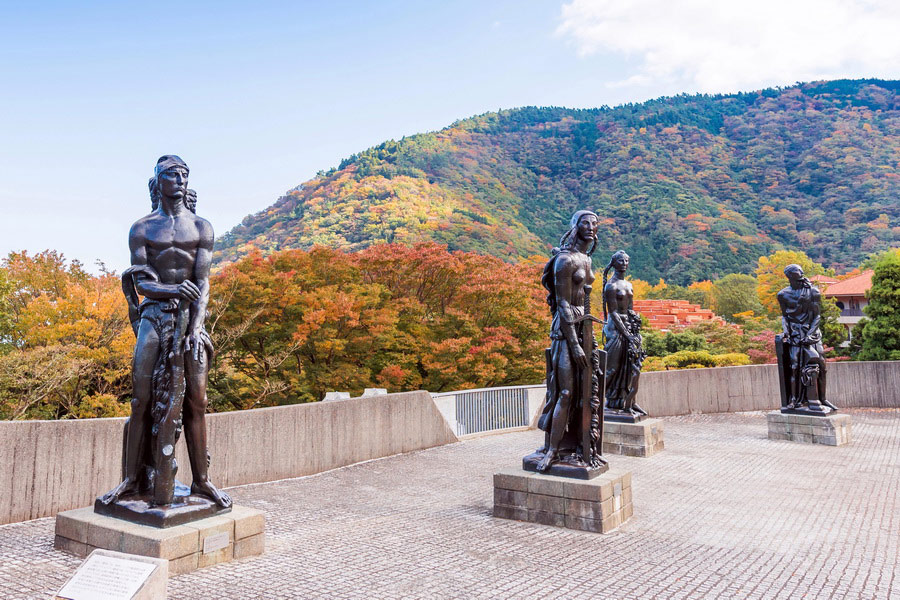
The small town of Hakone is full of intriguing and unique museums, each offering insights into the town's history and diverse representations of European art and literature.
The Hakone Museum of Art, one of the largest and most prestigious in the city, is often listed in the top 15 places to visit in Japan. Its main exhibition features around one hundred modernist-style sculptures set against the picturesque hills, making it an ideal location for a leisurely introduction to art. Children can enjoy the playground that is located in the section dedicated to modern art installations.
The inside pavilion is the museum's crown gem,housing a world-class collection of works by one of the most influential Spanish artists, Pablo Picasso. Over three hundred of his paintings are displayed in three rooms, offering visitors an insight into the key themes and periods of the iconic artist's career.
For those seeking a taste of Venice, the Venetian Glass Museum (Hakone Glass no Mori) showcases the enchanting atmosphere of this iconic city. The museum is designed to evoke the charm of Venice, exhibiting a collection that includes both ancient authentic examples of Venetian glass dating back 300-600 years and contemporary works crafted in the same style. A standout feature is the magnificent 8-meter glass fountain sparkling in sunlight near the museum's facade.
The Hakone Sekisho Museum features a reconstructed Tokaidō checkpoint that authentically captures the essence of the Edo period. As an open-air museum, it allows tourists to soak up the historical atmosphere while learning about the various stages of travellers' checks and inspections from that era, as well as insights into historical documents.
Finally, the Hakone Shinto shrine treasury, located within the main temple of Hakone, preserves relics that once belonged to samurai, including weapons, documents, and letters.
Each of these museums contributes to Hakone's rich cultural heritage and is a must-see for art lovers and history buffs alike.
Entertainment, Parks, and Shopping
Parks of Hakone
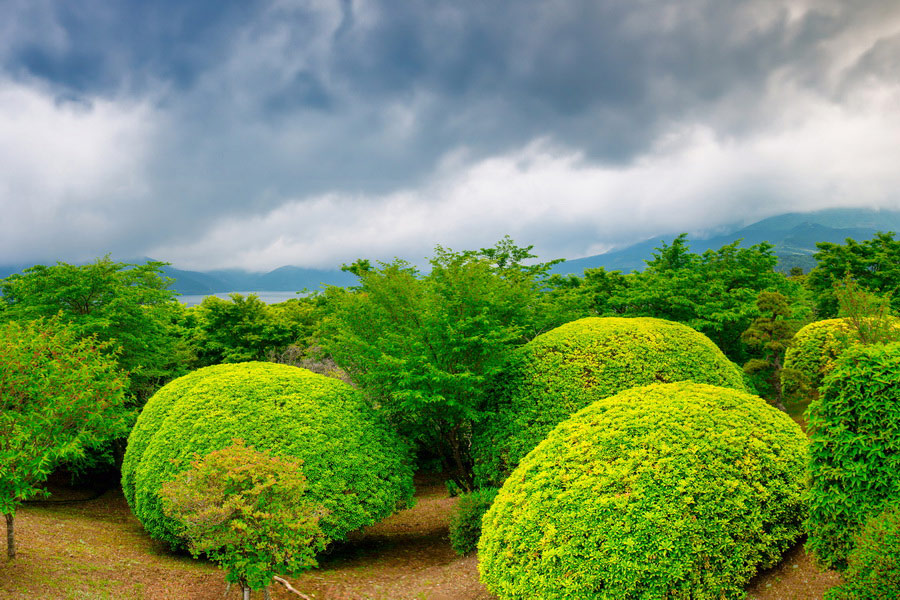
Nestled just 70 kilometres (about 43.5 miles) from Mount Fuji, Hakone is a part of the expansive Fuji-Hakone-Izu National Park, offering visitors stunning views of Japan's iconic natural landmark. On clear, sunny days, you can witness the breathtaking reflection of Mount Fuji on the tranquil waters of Lake Ashinoko. The town features several notable parks, including Onshi Hakone Park, Gōra Park, and the Sengokuhara Botanical Garden, each providing unique experiences for nature enthusiasts.
One of the standout attractions is the Cedar Avenue, a picturesque pathway that stretches for about a kilometre and is lined with over 1,000 majestic cedar trees, some boasting trunk diameters of up to 4 meters. Revered in Shintoism, these cedars are believed to possess healing properties, particularly beneficial for the respiratory system. This enchanting avenue has long been considered a place of mystical significance, attracting visitors who come to make wishes, that the locals believe will come true.
Shopping in Hakone
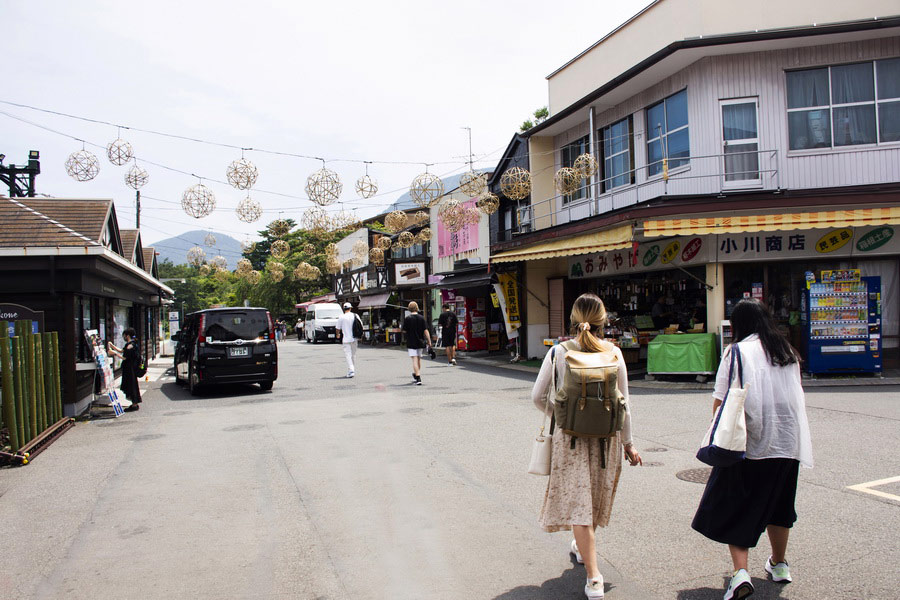
Hakone is famous for its charming handicraft shops, often referred to as Hakone Crafthouse, where you can find a range of unique souvenirs. From intricate figurines and traditional lanterns to delicious sweets and the famous wooden mosaic art known as 'yosegi', there's something for everyone. Popular craft shops in the area include Hamamatsuya and Kanazashi Wood Craft, each offering distinctive handmade items.
One of the most sought-after souvenirs in Hakone is black eggs, famously boiled in the volcanic hot springs. You can buy these unique delicacies at the Ōwakudani Kurotamago Kan.
Hakone has also become a pilgrimage site for fans of the popular anime series 'Evangelion'. The city plays an important role in the plot, and Hakone's Evangelion Store is a must-visit for enthusiasts. Here you can find a variety of merchandise, including t-shirts, bags, figurines, and other themed souvenirs celebrating the popular series.
Hakone Food Guide
What to Eat in Hakone?
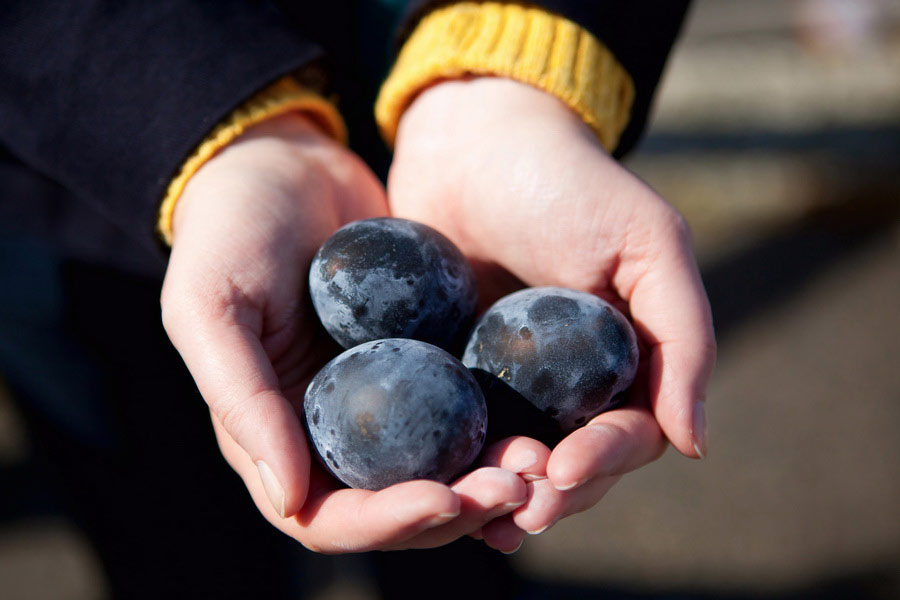
The main dish for tourists in Hakone is hakone black eggs, known in Japanese as Kurotamago. You can find them in the Ōwakudani Valley or specialized shops. These eggs are actually ordinary hen eggs, but their distinctive black shells are a result of being boiled in geothermal waters rich in iron and sulfur. People often purchase this dish not for its taste, which is quite unremarkable, but because of the belief that consuming a Kurotamago extends one's life by seven years.
Traditional Japanese noodle dishes such as udon and soba also hold a prominent place in Hakone's culinary scene. The udon from Hakone Temple is particularly renowned for its exceptional flavor and has won numerous awards in udon competitions across Japan. Seiro soba noodles is another local favourite dish, with delicious options available at the well-known Hatsuhana Soba restaurant.
How to Get to Hakone?
Reaching Hakone from Tokyo is easily accessible, with several transportation options available, including train, bus, and car. The quickest route is by train from Tokyo Station to Odawara Station, where the journey takes between 35 and 90 minutes (approximately 3 hours), depending on the train service you choose, and cost between 8 and 35 USD. Once you arrive at Odawara Station, a bus ride to Hakone will cost you around 3 USD.
For those flying in, the closest airport to Hakone is Haneda airport (HND), approximately a 2-hour journey away. Narita Airport (NRT) is also a viable option, taking around 2.5 hours to reach Hakone.
City Transport
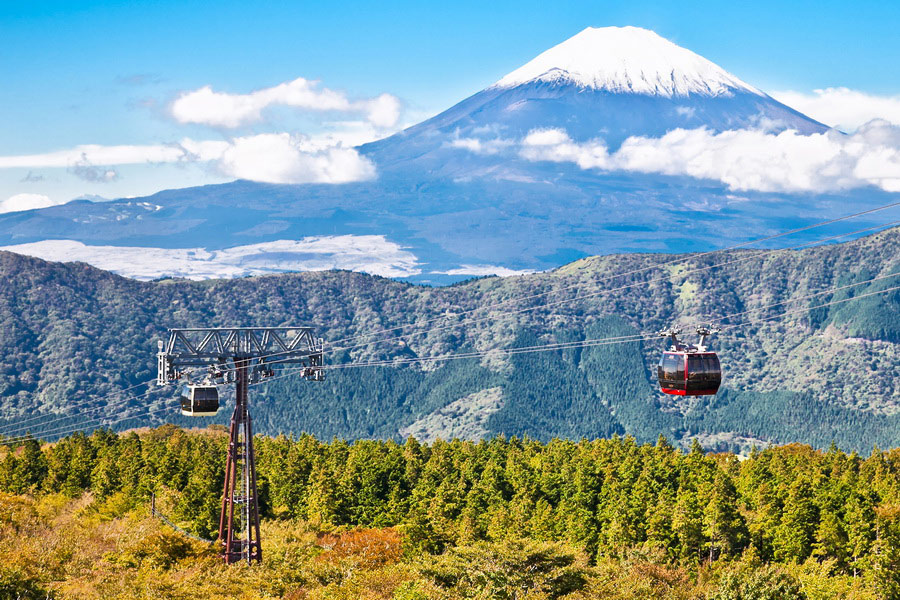
Hakone boasts a well-developed public transport system that offers various ways to explore the area. One of the most popular is the Tozan Train, renowned for its scenic route through the mountainous landscapes, making for a delightful half-hour ride.
The Hakone Tozan Cable Car operates on a short route that takes just 10 minutes to complete, providing a quick and enjoyable way to experience the local scenery.
Additionally, there are two Ropeways in Hakone. One ascends to the top of Mount Kamagatake, granting access to the newly established Mototsumiya Temple. The other, longer and more famous cable car connects Sounzan and Togendai, featuring four stations and a transfer stop at the bustling Ōwakudani.
For a unique experience, consider taking the Hakone Boat, a pirate-themed ship offering a half-hour cruise on Lake Ashinoko, where you can soak in stunning views of the lake, surrounding mountains, and the majestic Mount Fuji.
Traveling through Hakone using these various modes of transport creates a remarkable opportunity to admire the area's beauty and forms the famous Hakone Round Course or Hakone Loop. This route allows you to start and finish your journey at Hakone-Yumoto Station, with the following stops:
- Tozan: from Hakone-Yumoto Station to Gora Station;
- Cable Car: from Gora to Sounzan;
- Ropeway: from Sounzan to Togendai;
- Boat: from Togendai to Moto-Hakone or Hakone-machi;
- Bus: from Moto-Hakone back to Hakone-Yumoto.
This path, boasting a history of over 60 years, has evolved into a classic tourist route in Hakone. Travelers have the option to traverse it in either direction, making it flexible for various itineraries.
All transport journeys along this route are paid for separately or can be conveniently covered with special passes, such as the Hakone Free Pass. This pass includes access to all modes of public transport for a Hakone Loop 1-day trip. Available in two-day and three-day options, the Hakone Free Pass offers tourists the opportunity to save money significantly while exploring the area's stunning attractions.
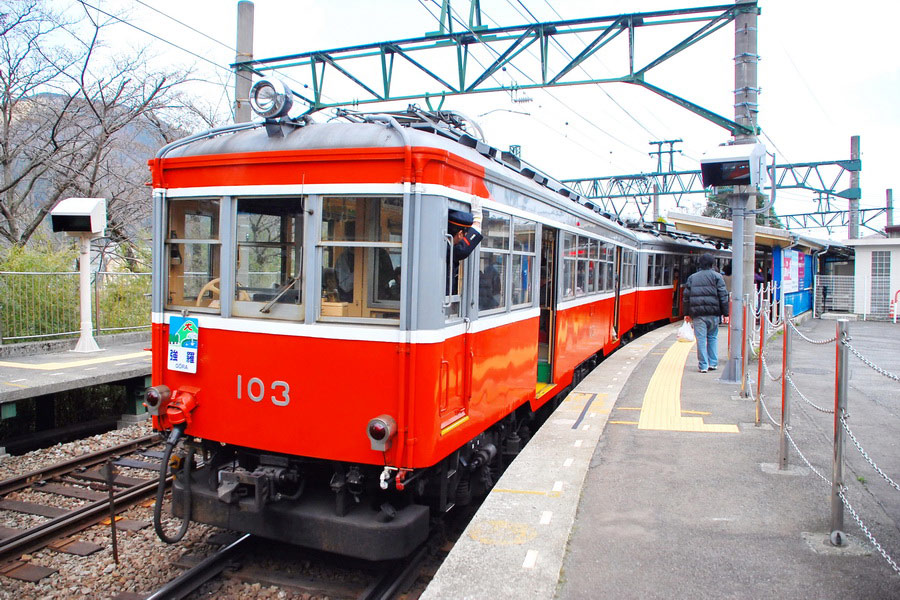
Security in Hakone
Hakone is an exciting and safe tourist destination. The city has reliable communications and a noriceable police presence, ensuring a safe environment for visitors. In addition, there are many hotels and guesthouses available for secure booking. Popular accommodation options in Hakone include Aura Tachibana Hakone Hotels, Hakone Airu and Asante Inn Hakone Guesthouse. Travellers can rest assured that they are in a welcoming and safe environment while exploring all that Hakone has to offer.
It is worth noting that despite the presence of active volcanoes in the Ōwakudani Valley, a trip to Hakone is safe for tourists as the volcanic activity here is classified as low (first level). Furthermore, accessible areas are securely fenced off, and zones beyond the fences are made inaccessible to the public, ensuring a secure experience for all visitors.


